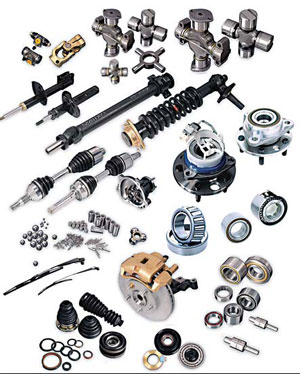

After fighting over four decades in the commercial sea, 63-year-old auto parts czar Lu Guanqiu says he will not retire until he dies.
"I'll stop working when I am too old to move. For people like me, as long as our brain still works we will always think about business," says Lu, chairman of Wanxiang Group.
Lu's tale is one of the most remarkable of Chinese entrepreneurs. Lu, often called "an evergreen tree" of private business in China, is the first generation of Chinese entrepreneurs since the country launched opening up policies three decades ago.
Most people regard his farm machinery workshop as the beginning of Lu's business. But in fact his entrepreneurial exploration started in 1965 when he opened a rice-and-flour mill workshop in his home village.

Born in an impoverished family, Lu worked as a blacksmith's apprentice at the age of 16 after graduation from middle school. He gradually developed a special feeling toward machinery during those three years.
At that time his fellow villagers had to walk three to four kilometers to the town center to mill their rice and wheat.
"Why can't we have a rice-and-flour mill in our village? I can also earn some extra money from it," Lu asked. The 20-year-old young man borrowed 3,000 yuan from relatives and friends and opened the mill.
As private businesses were forbidden in those days, Lu did not even give his workshop a proper name. But work soon spread among the villagers and his business began flourishing until it was discovered and labeled an "underground black factory", and forced to shut down.
Undeterred Lu didn't give up his dream of running a business. His next opportunity came in 1969 when the government allowed each rural commune to have a farm machinery repair factory. Lu, 24, opened the Ningwei People's Commune Agricultural Machinery Repair Factory with six farmers. The small workshop, the predecessor of Wanxiang, produced ploughs, harrows, and universal joints.
By 1978, the factory was hiring 300 people and produced parts for agricultural equipment and automobiles. Lu realized his factory could not remain on this plateau and in 1979 he decided to focus solely on universal joints (U-joints) for automobiles.
Lu's next break came in 1980 when he brought his universal joints to attend a national auto component fair in Shandong province. The obscure township village factory was not allowed to enter the hall with other large State-owned companies and Lu had to set up a small stand outside.
While inside the exhibition hall the buyers and sellers were wrestling over prices, Lu thought he could still earn some profit if he cut his prices by 20 percent. He soon attracted a lot of consumers who found his U-joints had the same or superior quality to larger brands and Lu finally received 2.1 million yuan in orders.
"Market competition is always about competing on price, quality and costs," Lu recalls. His universal joints later controlled 65 percent of the Chinese market.
When the rural household contract responsibility system was widely adopted across China in 1983, Lu used the trees, worth 20,000 yuan, in his own field as mortgage and signed a three-year contract with communion to run the universal joint factory. In the three-year contract period, he exceeded the contracted target sales volume every year.
The rural household contract responsibility system was a crucial part of China's economic reform. Under the system an individual household, or a set of households, assumed the task of production for and payment to the government in a contracted period of time. After fulfilling the quota and obligations, farmers were entitled to sell their surplus on the market or keep it for their own use. It enhanced farmers' incentives and promoted efficient production.
Lu bought out the shares of the U-joint factory in 1988 from the local county government with 15 million yuan and the Zhejiang provincial government approved the formal establishment of Zhejiang Wanxiang Machinery & Electronics Group in 1990.
Lu rarely takes a day off. With most of his family members current or former Wanxiang employees, he talks of little other than the company. His wife became an expert welder and worked through four pregnancies. She gave birth to her only son, now Wanxiang's president, Lu Weiding, in 1972 literally on the factory floor.
While many of his peers and competitors have fallen by the wayside, Lu remains an "evergreen tree" and has steadily diversified Wanxiang into other business areas including agriculture, finance, metals, banking and real estate. Wanxiang owns a 10 percent stake in Zheshang Bank, which is Zhejiang province's first private bank and specializes in serving the province's large base of small and medium-sized private enterprises that often cannot get funding from large State-owned banks.
Learning from others' failures has kept Lu's business empire from drowning in the highly competitive business world. When a well-known enterprise fell, Lu would ask people to collect all the information about it and summon other Wanxiang executives to his office for a corporate autopsy.
Lu hardly uses the Internet, but every day his secretary collects a thick pile of news and information for him and he passes the most important ones, with his footnotes, among other board members and executives.
Lu says his only hobby is working. "I can't sing. I don't dance. What am I supposed to do?" he adds.
He keeps a photo of his grandson in his pocket. Hoping the 8-year-old will someday run the company, he often asks the boy to sit on his lap while working. "I will teach him doing business just like how I taught his father," he adds.
(China Daily 04/14/2008 page12)













